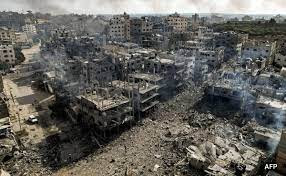Image courtesy NDTV
One of the most enduring memories of my service in Vietnam is the experience of being on the wrong end of a misdirected artillery strike. In May 1970, during operations with 7 RAR, American self-propelled M110 howitzers firing just on dusk from the Horseshoe sent two salvos into our night platoon harbour which went within a whisker of cleaning us up. Fortunately they landed in front of our position, and the shrapnel went forward, away from us. The worst we endured were the seconds of sheer terror as we heard it coming, and the shards of split timber from the trees it hit flying about.
Fortunately we were on stand-to and hadn't put sentries out at the time, as any digger out in front of the position would have been mincemeat. The fact that we discovered later that the gun crew was high on marijuana at the time didn't improve our lack of respect for Americans in general, and US artillery in particular. They had forgotten to check the position of "friendlies" and we were ambushing a track junction. The Yanks were firing H & I (harassment and interdiction) missions and this same track junction was a juicy target.
I mention this to explain that I know what it feels like to be attacked with high explosives designed to kill and maim. The last few seconds involve an eerie whistling sound that I can still hear, fifty-three years after the incident.
Imagine the terror of civilian populations subject to this hi-tech carnage daily and consider how they might react.
There's plenty of history. Let's examine World War Two, gentle reader. First there was the London blitz, and then the area bombing of the Ruhr, and cities such as Hamburg, Dresden, and Cologne. Earlier in the war, the Japanese bombed Chongqing in China a total of 268 times in an effort to terrorise the population. Our own country was bombed on 19th February 1942, when Darwin was attacked, and Broome followed on 3rd March the same year. Neither the Londoners, the residents of these German cities, or of Chongqing or Darwin became enamoured of those doing the bombing. In fact, the civilians involved typically got behind their armed forces after these incidents.
The bombing of Hiroshima and Nagasaki cost about ninety-four thousand deaths. This loss of life was justified by the Americans using the argument that it saved hundreds of thousands of GIs who would have died in a conventional maritime invasion of the Japanese homeland. Hiroshima nd Nagasaki stand out because of the use of nuclear weapons, rather than the number of civilian casualties, which were actually less than those resulting from the fire bombing of Tokyo. This justification has been disputed by some historians who claim that the Japanese surrender was precipitated by the Soviet declaration of war two days after Hiroshima and one day before Nagasaki.
Between 1965 and 1970, the Americans dropped 2,756,941 tons of ordnance on Cambodia, destroying most of the minimal infrastructure in that country, and terrorising the population. There is a strong argument that this terror drove the population into the arms of the Khmer Rouge, and the killing fields followed as a direct outcome a few years down the track. After patrolling in areas of Phuoc Tuy where B-52 strikes had been conducted in 1970, and coming across the vast overgrown craters left by these raids, I can well understand the reaction of any civilian population to indiscriminate bombing, and the desperation they must have felt.
Then there was the "shock and awe" unleashed by US forces on Iraq in 2003. It was followed after the American withdrawal by the rise of ISIS, which reached its zenith in 2015. That was twelve years after "shock and awe". The Killing Fields were perpetrated by the Khmer Rouge between 1975 and 1979, ten years after the bombing. These are two very similar examples in recent history of the long-term outcomes of attempting to bomb a population into submission. The result in both situations seems to have been the rise of the most evil of terrorist groups.
Now we are seeing the Israeli bombing of Gaza. Let's hope that the outcome will not be the strengthening of the existing Hamas hold on the Palestinians.
One thing I am sure of, gentle reader, is that the residents of Gaza will not feel any sympathy for the Israelis killed and captured on October 7th. Getting bombed has that result. If history is a guide, the bombing will have a long term effect that will remove any likelihood of peace in the Middle East in my lifetime.
Bombing people does not win their friendship, nor does it ever influence them to hold a favourable view of those responsible. That simple and understated historical message seems to have completely escaped the military leaders involved.




